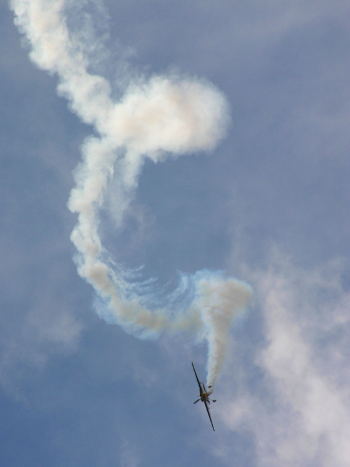Experiment in Madness

Imagine an airplane in an experiment set up by mad scientists. The plane has a limited amount of fuel, so must come down sooner or later. The mad scientists give the plane’s 1000 inhabitants money every minute the plane is in flight, paying more money the faster and the higher it goes. The money is allocated unevenly, with decisions made by those with the most money. So the 10 passengers who own 50% of the wealth pilot the plane, taking into consideration the ideas of the next wealthiest 90 passengers who own another 38%. The pilots ignore the 900 passengers who share the remaining 12% of the plane’s wealth. Happily, nearly everyone is excited for the plane to go as fast and high as possible, in hopes of increasing their earnings.
The pilots burn the jets at full speed with the plane angled up as far as possible without becoming destabilized. Though they realize the plane will soon run out of fuel and be stranded at high altitude, they expect to use the 10 parachutes on board to escape with their wealth before the plane hits the ground. Many of the less wealthy passengers are vaguely concerned, but don’t look at the instrument readings to understand the full situation. They trust that the pilots will devise a plan to avoid disaster while keeping the money coming.
A few passengers feel great alarm. They estimate remaining fuel as barely sufficient to allow a safe landing if the plane begins immediate descent. They observe that the faster the plane flies, the faster these scant reserves are depleted, while the higher the plane gets, the more dangerous will be its descent. But the pilots seem intent on rocketing upwards until the plane is completely out of fuel and nearly uncontrollable.
The alarmists attempt to warn everyone of the looming danger, and a handful of other passengers stop competing for and counting their money long enough to hear what they’re saying. Though most of these quickly tune out the alarmists’ message (which isn’t nearly as interesting as money and what it can buy), a few grudgingly acknowledge that accelerating endlessly upwards might be a bad idea. But no one likes the idea of ending the joy ride by deliberately landing the plane, so there’s general mumbling about staying in flight forever by installing solar panels and wind turbines on the wings. (A physicist tries to point out that solar & wind can’t do more than keep the cabin lights on, but the mumblers raise their voices enough that they needn’t hear such pessimism.)
Some vow to voluntarily limit their share of income from the plane’s suicide path, then wander away to tend potted plants and meditate. Meanwhile, the pilots ignore the chatter and stay on course. With no prospect of swaying the pilots through reason or of inspiring the passengers to wake and rise up, many of the alarmists succumb to despair or hedonism.
Finally, someone has the idea of cutting the fuel lines feeding the engines. Though it would be ideal if the pilots used the engines for a safe landing, their choice to use every bit of fuel to accelerate towards demise makes sabotaging the engines the next best option. The plane will at least stop gaining dangerous altitude, and will retain enough fuel to power critical systems with a backup generator.
How will this experiment end? Will the plane’s riders go higher and faster for their largest payments yet, followed by a grisly crash killing not only them, but also ground-dwelling bystanders? Or will the saboteur cut the fuel lines in time for the passengers to break out of their hypnosis and glide the plane to an emergency landing?
Consider supporting our work by joining our mailing list below, sharing & "liking" this page, and following us on social media. You may freely republish this Creative Commons licensed article with attribution and a link to the original.